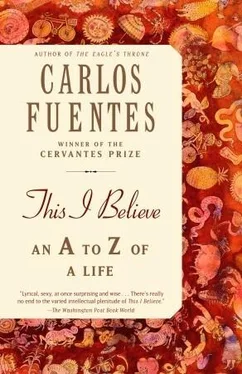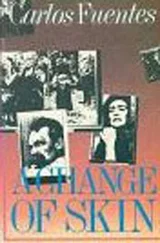But while these were the bright lights of politics, the shadows that hovered over everything during those years threatened to extinguish them entirely. Spain’s war was the first sign of a political regime that was openly designed to serve the interests of evil. Franco disguised it as a nationalist crusade, his bishops blessed it, and his fascist and Nazi allies provided the weapons for it. Spain was a warning of what was to come. Never before in history had evil proclaimed itself as such, so openly and without any kind of aesthetic justification. Genocide, absolute tyranny, racism, extermination, the Holocaust, the Final Solution: it was all a foregone conclusion. Adolf Hitler decided that the Devil should finally take human form. If God had done so with his son, Jesus, Satan could do the same with his clone Adolf. Jaspers warned us in advance that Hitler’s strength resided in his lack of existence: Hitler was the empty leader of the rootless masses.
The defeat of the German socialists and Communists in 1932 can be explained by the fact that the Left looked at the world through the tunnels of economic infrastructure, exactly as the Marxist bible preached. Hitler kidnapped the cultural superstructures, looked up toward the heights of Valhalla, and appealed to the Wagnerian myths, to the dreams and false illusions of the German Volk, to the damage and humiliation of the peace at Versailles, to his country’s sense of ethnic and intellectual superiority, and to their physical need for a space to live, the Lebensraum. His evil and its means were always so transparent. Yet the lies Stalinism told may have been even worse, for Communism was a movement that was supposed to put a humanistic, liberating philosophy into practice. Stalin’s perversion of the socialist dream— the purges, the Gulag, the abolition of the most basic rights, the leader’s paranoia, and the atrocities of his torture — was worse than the fulfillment of the Hitlerian nightmare. Hitler never deceived anyone. Stalin donned the mask of Marxist humanism and cheated hundreds of thousands of honorable, devoted, though perhaps naïve Communists. Gide may have lost his faith in 1936, but Aragon hung on until the invasion of Czechoslovakia, and Neruda held out until Khrushchev’s report to the Twentieth Communist Party Congress.
World War II was justified; it has been called the only good and necessary war. Our youthful solidarity enthusiastically joined forces with the fight against fascism. I spent the war years in Argentina and Chile, the latter being the first Latin American country to consciously develop into a democratic system, from a democracy of aristocrats to a democracy of political parties, the press, and social organizations. In 1941 the Frente Popular (Popular Front) was in power, with Pedro Aguirre Cerda as its president, and the prevailing spirit was one of social reform backed by a literary growth that fused words with freedoms, poetry with politics. My Chilean education necessarily contrasted quite powerfully in my mind with Argentina, where I lived during 1944. A fascist military regime, sinister precursor to Perón’s populist dictatorship, deformed education (the anti-Semitic Hugo Wast was minister of education at the time) and maintained Argentina as fascism’s political redoubt and, later on, a safe haven for Nazis on the run.
Politics may very well be the eagle that flies higher and achieves a broader vision of things from the “high cliff of the human dawn,” as Pablo Neruda asserted in his Canto General. Or perhaps it is Yeats’s “rough beast” of “The Second Coming” that “slouches towards Bethlehem to be born.” The Cold War tried to put the eagle in a cage and cast a spell upon the serpent, replacing them with a hybrid between camel and crow, that sleepy creature of the desert so resistant to thirst, and that rapacious scavenger bird, ready to claw our eyes out. With McCarthy, the United States succumbed to an anti-Communist paranoia that led its inquisitors to emulate the very thing they were fighting against, the intolerance and cruelty of Stalinism. The resistance of the North American democratic institutions held out and, as an extension of their social struggle, set the stage for the civil rights movement and antidiscrimination laws. There was a McCarthy. There was a Martin Luther King, Jr. But if Americans can sometimes be benevolent Dr. Jekylls inside their own country, they so easily become monstrous Mr. Hydes when they leave its borders. The good-neighbor policy of coexistence with the Mexican and Chilean Left, Brazilian corporativism, or the Central American and Caribbean dictatorships (“Somoza is a son of a bitch, but he’s our son of a bitch,” as FDR said) turned into an anti-Communist campaign under Eisenhower and Dulles. This campaign confused Kremlin politics with many reformist movements, and ended up fighting them all: Arbenz in Guatemala and Goulart in Brazil, the seductive and comprehensible revolution led by Castro in Cuba, and the cleanly elected democratic government of Salvador Allende in Chile.
All of this fatally stunted the growth of much-needed social, economic, and political reform in Latin America, and plunged Cuba into an extralogical imitation of “real socialism” as pernicious as the extralogical imitation of the models of authoritarian capitalism in the rest of Latin America, which would become ruthless dictatorships in Chile, Argentina, and Paraguay. As a result, politics in Latin America has come to be synonymous with reconstruction but above all construction. Chile, Uruguay, and to a certain degree Argentina, can restore democracy. Central America and the Caribbean must construct it, while Mexico must transform the “perfect dictatorship” of the singularly powerful PRI president into an imperfect democracy with political parties, division of powers, accountability of the executive branch, activation of human capital, and improved distribution of income.
How can the challenges of democracy be met?
The world stage has undergone radical changes. The Cold War created a kind of shared jurisdiction between the United States and the Soviet Union based on the balance of nuclear terror. Ever since then, we have witnessed the weakness and, occasionally, the disappearance of traditional methods of social bonding and problem solving.
Nation and empire, state and international community, public sector, private sector, and civil society. All these traditional labels are now very clearly — sometimes paradoxically, sometimes furtively — in crisis or at least in mutation.
Why does this happen?
Because we have not been able to create a new legality for a new reality — the reality of globalization.
The modern Western world — that is, from the Renaissance onward — built itself around notions that had little relevance in the medieval realm: the nation, the state, international law, the mercantile-capitalist economy, and civil society.
What kind of relevance — moreover, what kind of reality — do these circumstances represent to our globalized, post — Cold War world? Given that Latin America finds itself situated between both of these premises, we can venture to suggest some shared ideas.
Nation and nationalism, for example, are modern terms that arose to legitimize notions of territorial, political, and cultural unity, and were necessary for the integration of the new states that emerged from the rupture of medieval Christian communities.
But what, then, provoked the emergence of nationalist ideology?
Emile Durkheim speaks of the loss of old centers of identification and adhesion.
The nation fills that loss.
Isaiah Berlin adds that all nationalism is a response to a wound inflicted by society.
The nation heals that wound.
Читать дальше












